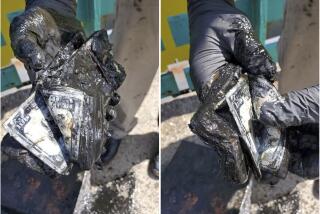Integrity Pays Off for Bookkeeper Who Found $100 Bill
Jean Shikuma of Fullerton enjoyed the integrity challenge I dreamed up for last Sunday’s column. Part of the reason is because she was in the middle of an integrity-tester of her own.
In my imagined scenario, two friends head off on a weekend camping trip. Just before they leave civilization on a Friday night, one buys a lottery ticket. He dies that night. The next day the other friend learns that the ticket is a $10-million winner. Only the two of them knew who bought the ticket, raising the question: Does the friend tell the widow her husband bought the ticket?
Reading that prompted Shikuma to drop me a line: “Your article on integrity was very timely. Would you be interested in just one more story of a challenge to integrity?”
Ethical challenges and human beings. I love any story when those two elements mix.
Shikuma, a bookkeeper, was leaving the Southern California Bank in Anaheim nine days ago when she spotted a hundred-dollar bill on the ground just outside the door. No one was around, but instead of pocketing the money, she turned it in to bank employee Ky Chen. She explained to him that she didn’t feel right keeping money that someone else might have lost. She left the money with Chen but with the understanding that she expected it to be returned to her if no one claimed it.
She then went to work.
So far, we’d all agree that Shikuma scored 100% on the integrity test.
Later, however, she began to wonder--especially after a friend pointedly questioned her sanity. The friend couldn’t believe that Shikuma hadn’t kept the money. “For an instant,” Shikuma says, “I did start to doubt my logic.”
She couldn’t seem to convince her friend that keeping the money never occurred to her. “I hated to gain from someone else’s loss,” she said. “How few of us can afford to lose $100? Perhaps that person would retrace his or her steps and hope against hope that the money would be found and turned in.”
The friend argued that a bank employee could keep the money and simply tell Shikuma that someone had claimed it. No one would be the wiser. Or, Shikuma’s friend said, anyone who happened to hear about the story could call the bank and claim the cash. Shikuma conceded those points and began to fret. After all, she did find the money. Besides, by then she had thought of a whole bunch of ways she could have spent the $100.
Funny how these things turn into conscience-tuggers, isn’t it? We know instinctively what the right course of action is, but then we start thinking about it and we come up with plausible rationalizations why we shouldn’t follow our instincts.
Shikuma’s friend was right about what could have happened. Here’s what did happen, according to bank branch manager Marty Ferraro: Chen brought the $100 to her and asked what they should do with it. Ferraro put the money in an envelope, wrote Shikuma’s name and phone number on it and locked it in the bank vault.
With her friend’s words weighing on her, Shikuma let matters rest for a few days. Then, last Tuesday, she went to the bank and asked if anyone had claimed the cash. Ferraro said no, went to the vault, got the envelope and handed it to Shikuma. As she waited, other employees praised Shikuma for her honesty, not knowing that all the while Shikuma was thinking it was they who should be thanked for theirs.
“She seemed just a bit surprised,” Ferraro said, in describing Shikuma’s reaction to receiving the money.
From then on, Shikuma breathed a sigh of relief and not just because she was $100 richer. As she wrote in a thank-you letter to bank executive vice president Dave McCoy: “I want you to know how refreshing and affirming it is that your employees value honesty and integrity.”
As for her windfall, Shikuma told me: “I believe the $100 is rightfully mine. I am sorry for the person who lost it. I gave the money to my daughter who just had a baby and is struggling to make car payments.”
A small tale, I know, but if we write about the various ethical lapses of our fellow citizens, it’s helpful to hear about these otherwise acts of simple decency that pass without notice.
Shikuma doesn’t want to come across as someone who did an extraordinary thing.
I know what she means. These tests come along, and we make our decisions. Sometimes we do the right thing; sometimes we don’t.
But she did leave me with one comforting thought: “I was thinking today,” she said, “that if this were to happen again, how much easier it will be to turn in the money. I found out through experience that it was the right thing for me to do.”
Readers may reach Dana Parsons by writing to him at The Times Orange County Edition, 1375 Sunflower Ave., Costa Mesa, CA 92626, or calling (714) 966-7821.
More to Read
Sign up for Essential California
The most important California stories and recommendations in your inbox every morning.
You may occasionally receive promotional content from the Los Angeles Times.










